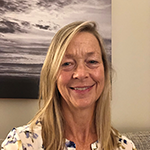‘I learned that many members of Congress & their staff have no idea what a rheumatologist is or what we do.’ —Brian Loggins, BA, BS
“That day on the Hill was very enlightening. I learned that you don’t always meet with the actual member of Congress, but sometimes with a member of their staff. I learned that just because you have a meeting scheduled does not mean it is going to happen as planned. I learned that many members of Congress and their staff have no idea what a rheumatologist is or what we do. I learned that physicians, academicians, and scientists are not always the best at persuading.
“I also experienced great satisfaction when the member or staff person listened, understood and agreed to support whatever issue or bill we were in support of. It is always a long, busy and tiring day, but well worth it.
“Since my first trip to the Hill, I have gone back five times to D.C. and have participated in virtual trips to the Hill twice. I really enjoy doing it and would encourage anyone who might be interested in advocacy to contact the ACR and volunteer.”
The ACR Makes Advocacy Easy

Ms. Robbins
Lisa Robbins, BSN, RN, CPN, is a clinical care manager in pediatric rheumatology, Penn State Health Children’s Hospital, Milton S. Hershey Medical Center, Hershey, Pa. “Patient advocacy has never been more convenient in the world of rheumatology,” says Ms. Robbins. “The ACR offers many opportunities for advocacy engagement, ranging from simple letter writing, through the Voter Voice app on the website, to interacting with our legislators directly during a Hill visit.
“Many years ago, as a novice pediatric rheumatology nurse, I first became involved in advocacy efforts in partnership with the Arthritis Foundation. I recall volunteering at an AJAO [American Juvenile Arthritis Organization] meeting, which was in D.C. that year, in the late 1990s. We attended pre-arranged meetings with our legislators, followed by a picnic on the Hill with patients and their families, along with rheumatology health professionals and legislators. The idea that ‘kids get arthritis too’ was novel to many of the legislators. How powerfully these kids could communicate the needs of this particular population.
“Fast forward to September 2020. With the pandemic precluding face-to-face visits for anyone on Capitol Hill, the idea of a picnic together was impossible.
“As an ARP representative on the GAC, I continue to be involved in sharing our patient’s needs with our legislators. September is an important month for ACR advocacy, because we get to interact with our legislators as representatives of the rheumatology care community alongside patients.
“Our ACR staff work year-round to develop relationships and advocate for the issues prioritized by the GAC. We receive coaching on how best to share our concerns and eloquent written information to provide to our legislators.
“This past year, the ACR pivoted to virtual visits, so we were still able to interact with our legislators and share information about our advocacy priorities. Our patients’ stories continue to be very impactful.
“I invited a 10-year-old patient to join us and speak to our legislators about why pediatric rheumatologists are needed. This healthy child had fallen into some pool-side landscaping in 2019 and suffered a nasal fracture. He developed a fever and was sent home from his local emergency department (ED) with antibiotics. He presented to our ED and was diagnosed with strep pneumonia meningitis and bacteremia.
“His course was complicated by seizures, bilateral MRI changes consistent with ischemia and narrowing of internal carotid arteries, so a rheumatology consult was requested. The child was [diagnosed with CNS vasculitis,] ultimately discharged from the pediatric intensive care unit (PICU) 19 days later, and the rehabilitation hospital a week after that, to continue his outpatient care with a pediatric rheumatologist.
“He has recovered from this secondary CNS vasculitis with just some residual unilateral sensorineural hearing loss and focal epilepsy. He doesn’t recall much from his time in the PICU or the rehabilitation hospital, but told the legislators that his rheumatologist, embodying ‘cognitive care specialists,’ helped him get back into life, school and onto the baseball field again. The patient and his family were incredibly thankful to have a pediatric rheumatology team available.
“This child helped make real and memorable the idea of why the ACR was advocating around workforce issues to have rheumatologists available when needed, evaluation and management code increases for cognitive care management and, even, parity for telehealth visits. (The patient’s family had shared their concern about immunosuppression from steroids and their son’s COVID-19 exposure risk.)
“The work of the ACR—including the staff, the GAC and other engaged providers—and our patients in advocacy for issues important to the practice of rheumatology is imperative, and I am thankful for the opportunity to continue to participate.”

